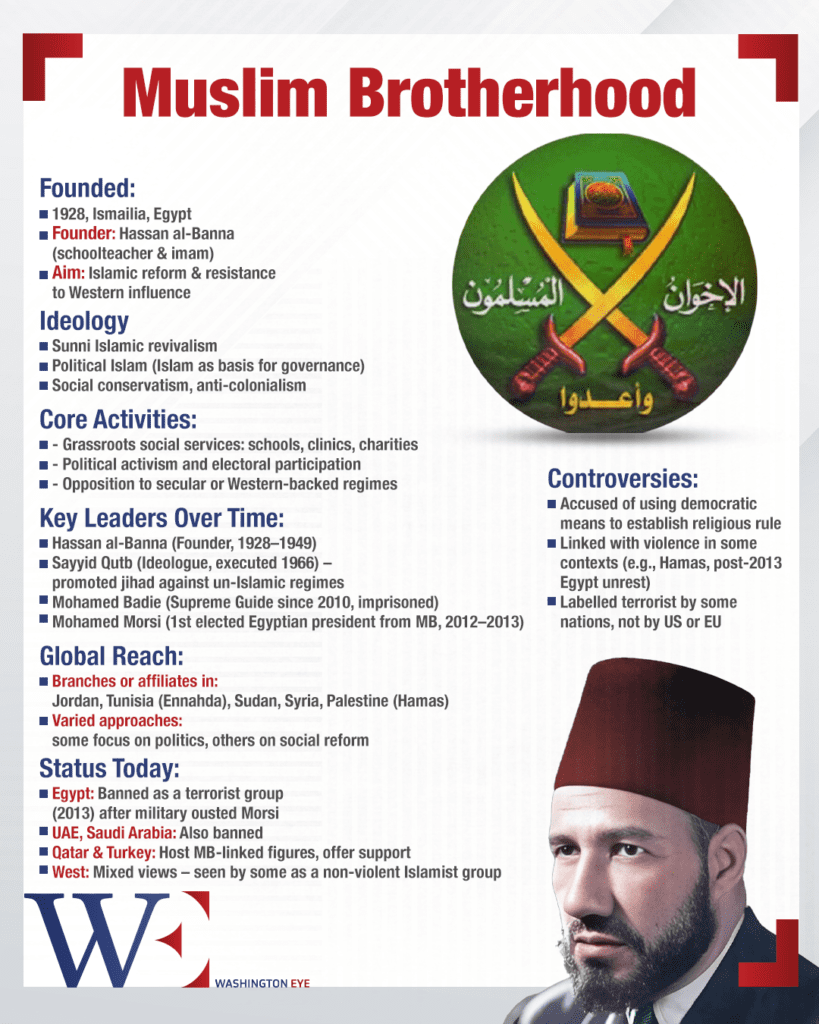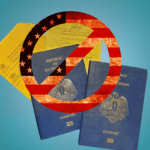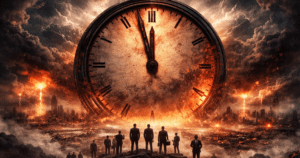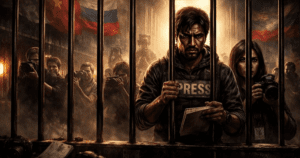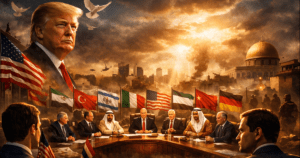If Team Rocket got a masterclass in political strategy from Machiavelli and a PR package from LinkedIn, they’d look a lot like the Muslim Brotherhood. Slick, calculated, and always one step ahead of suspicion, the Brotherhood isn’t lobbing bombs. They’re shaking hands, opening schools, and sitting on advisory boards. But behind the smiles lies a rigid vision of control dressed up as reform.
1928 wasn’t just the year Mickey Mouse was born. It was also the year extremism in a necktie got its first formal office. That year, while fascism marched across Europe, Hassan al-Banna founded the Muslim Brotherhood in Ismailia, Egypt. His rhetoric borrowed more from authoritarian playbooks than Islamic theology. He didn’t just preach piety. He engineered political conquest. Scholars like Hillel Fradkin and Eric Brown argue that al-Banna’s real innovation was not religious reform but the fusion of Islam with totalitarian structure.
If al-Banna was the franchise founder, Sayyid Qutb was the dark sequel. Think Joker with a typewriter and apocalyptic certainty. While imprisoned under Nasser, Qutb’s writings mutated into a roadmap for violent jihad. His book Milestones (Ma‘alim fi al-Tariq) wasn’t just a manifesto. It was the intellectual embryo of modern Islamist terrorism. From Al-Qaeda to ISIS, the fingerprints of Qutb’s ideology are all over their rhetoric. Gilles Kepel, a leading scholar on radical Islam, calls him the godfather of global jihadism.
The Brotherhood claims it turned the page on violence, but they left sticky fingerprints on the next chapter. Hamas, officially formed in 1987 as the Palestinian wing of the Brotherhood, remains one of the clearest examples of how ideology morphs into militancy. A 2015 review by the UK government, led by Sir John Jenkins, concluded that aspects of Muslim Brotherhood ideology and tactics are contrary to British values and may encourage radicalization. Lorenzo Vidino, Director of the Program on Extremism at George Washington University, has documented how Brotherhood-affiliated charities, youth groups, and mosques quietly create ideological pipelines.
If Europe was a classroom, the Brotherhood would be that student pretending to take notes while slowly changing the syllabus. Since the 1950s, Brotherhood operatives have established sprawling networks in France, the UK, and Germany, often under different names like the Federation of Islamic Organizations in Europe (FIOE) or Muslim Association of Britain (MAB). Their influence seeps through councils, universities, and moderate Islamic groups. As Dr. Cynthia Farahat noted, this deceptive moderation is part of their long-term strategy. The façade of integration masks a deeper resistance to secular democratic norms.
Even former UK Prime Minister David Cameron, hardly a tabloid headline-chaser, warned that the Brotherhood’s cultural resistance to Western values undermines the very social cohesion it claims to protect. This is not about religion. It is about replacing liberal democracy with religious supremacy, one softly spoken sermon at a time.
Some countries aren’t buying the act. Egypt banned the group in 2013 following mass protests against its brief and turbulent rule under Mohamed Morsi. The UAE and Saudi Arabia followed suit, branding the Brotherhood a terrorist organization. Meanwhile, much of Europe remains hesitant, caught between fears of alienating Muslim communities and naïveté about the Brotherhood’s intentions. Juan Zarate, former Deputy National Security Advisor for Combatting Terrorism in the US, put it bluntly. The Brotherhood’s patient, strategic approach makes them more dangerous than openly violent groups.
What’s needed isn’t panic. It is policy. A coordinated European stance to monitor, restrict, and in some cases ban Brotherhood-affiliated networks would not be a crackdown on Muslims. It would be a defense of Muslims and non-Muslims who believe in pluralism, civil rights, and individual freedoms. Letting the Brotherhood operate freely is like giving Scar from The Lion King a UN seat and hoping he champions peace in the savannah.
Let’s also drop the fantasy that al-Banna was some misunderstood intellectual. He was Emperor Palpatine wrapped in Quranic citations, architecting ideological absolutism with messianic ambition. Sayyid Qutb was not a poetic soul crushed by the West’s materialism. He was a literary warhead whose pages exploded into generations of terror. The modern Brotherhood might swap robes for suits, but the game remains the same. Infiltration, isolation, indoctrination.
Sure, you can laugh at cartoon comparisons, but the threat is no laughing matter. As Mr. Burns from The Simpsons would say with sinister satisfaction, “Excellent…” every time society blinks. The Brotherhood thrives not in battle but in boredom. And the lesson from history is clear. Extremists don’t need to shout when the rest of us are silent.
